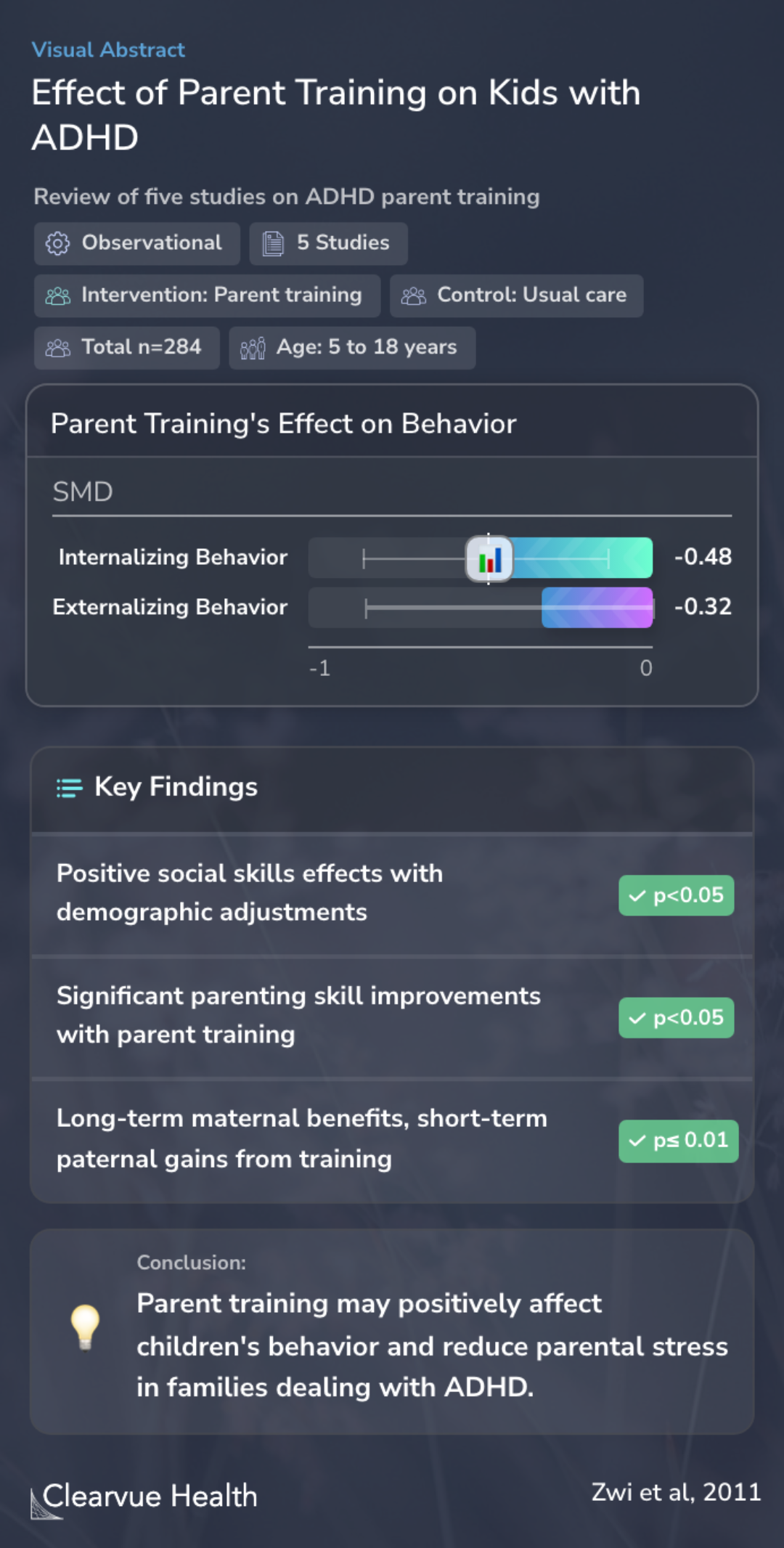Parent training interventions for Attention Deficit Hyperactivity Disorder (ADHD) in children aged 5 to 18 years
Effect of Parent Training on Kids with ADHD
Zwi M, Jones H, Thorgaard C, York A, Dennis JA

Objectives
This study aimed to see whether parent training was effective in improving ADHD symptoms in young children.
To determine whether parent training interventions are effective in reducing ADHD symptoms and associated problems in children aged between five and eight years with a diagnosis of ADHD, compared to controls with no parent training intervention.
Methods
The study found five trials with 284 participants that compared parent training to the usual treatment for ADHD in kids. One trial also had a parent support group as another control. Four studies looked at children's behavior problems, while one checked for changes in parenting skills.
We searched the following electronic databases (for all available years until September 2010): CENTRAL (2010, Issue 3), MEDLINE (1950 to 10 September 2010), EMBASE (1980 to 2010 Week 36), CINAHL (1937 to 13 September 2010), PsycINFO (1806 to September Week 1 2010), Dissertation Abstracts...
Results
Of the four studies on children's behavior, two looked at behavior at home and two at school. The home behavior studies had different findings - one found no difference between parent training and usual care, while the other reported significant benefits for parent training. The school behavior studies also differed - one found no group differences, but the other saw parent training worked better when ADHD wasn't combined with oppositional defiant disorder, especially for girls and medicated children.
Combining three studies' data on outward behavior fell short of statistical significance. However, a meta-analysis of two studies on inward behavior showed significant improvement in the parent training groups.
A study comparing parent training to a support group found significant parenting skill improvements with training. A meta-analysis of parent stress data from two studies showed significant reductions in child-related but not parent-related stress. One small study suggested moms benefited long-term from individual training while dads improved short-term from group sessions. Another found parent training significantly reduced stress in just one of two active treatment groups.
We found five studies including 284 participants that met the inclusion criteria, all of which compared parent training with de facto treatment as usual (TAU). One study included a nondirective parent support group as a second control arm. Four studies targeted children's behaviour probl...
Evidence Comparison
The current study aligns with several established practices in ADHD treatment across different age groups. As highlighted in the current evidence, a combination of medication, parent training in behavior management (PTBM), and behavioral classroom interventions is typically recommended for school-aged children with ADHD. The study's focus on parent training interventions for children aged 5-8 years is consistent with this multimodal approach.
The mixed findings regarding the effectiveness of parent training on children's behavior at home and school also reflect the complexity of ADHD management noted in the current evidence. While parent training is a crucial component, its impact may vary depending on factors such as delivery format (individual vs. group) and comorbid conditions like oppositional defiant disorder.
The study's results showing potential benefits of parent training on reducing parental stress and enhancing parental confidence are in line with the current understanding of the importance of involving and supporting parents in ADHD treatment.
Conclusions
The study suggests that parent training may positively affect children's behavior and reduce parental stress in families dealing with ADHD. However, the results should be interpreted with caution due to the poor methodological quality of the included studies, which increases the risk of bias. The data on ADHD-specific behavior are mixed, and there is a lack of evidence for important outcomes like school achievement and adverse effects. While the findings point to potential benefits of parent training, they are not strong enough to form the basis for clinical practice guidelines. More high-quality research is needed to clarify the effectiveness of parent training interventions for children with ADHD.
Parent training may have a positive effect on the behaviour of children with ADHD. It may also reduce parental stress and enhance parental confidence. However, the poor methodological quality of the included studies increases the risk of bias in the results. Data concerning ADHD-specific...
Key Takeaways
Context
The study above investigated whether combining ADHD medication with social skills training could improve children's social functioning. Interestingly, they found that adding social skills training to medication did not significantly enhance social skills. This suggests that for children with ADHD, medication alone may be sufficient to support social functioning, without the need for additional training.
Another relevant study is "Meta-analysis of organizational skills interventions for children and adolescents with Attention-Deficit/Hyperactivity Disorder" by Bikic A et al. (2017).
This meta-analysis explored the effectiveness of Organizational Skills Training (OST) for children with ADHD. The results showed that OST led to significant improvements in organizational skills, attention, and academic performance. These findings highlight the potential value of incorporating OST into treatment plans for children with ADHD to support their academic and organizational functioning.